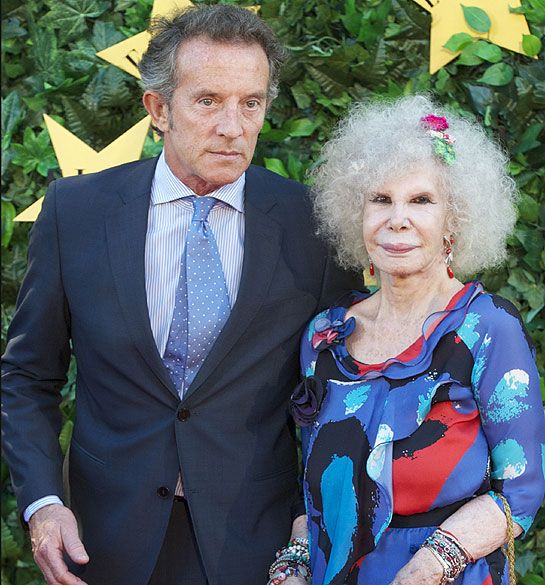- Main title is inherited by eldest son, Carlos Fitz-James Stuart
- Most of her riches are owned by the Casa de Alba Foundation and non-taxable
 |
| Duchess and Alfonso Díez (hellomagazine.com) |
SEVILLE -- Doña María del Rosario Cayetana Paloma Alfonsa Victoria Eugenia Fernanda Teresa Francisca de Paula Lourdes Antonia Josefa Fausta Rita Castor Dorotea Santa Esperanza Fitz-James Stuart y de Silva Falcó y Gurtubay, better known as the Duchess of Alba, died just a few days ago (November 20). A few days before that she had been declared the third richest woman in Spain by Forbes Magazine, which calculated her fortune at the €3 billion, including property, farms, jewelry, art works, financial investments and unique items such as castles, palaces and fifty-one nobility titles. Her funeral was 'very intimate', according to reports. So now comes the matter of her heirs and their inheritance.
As we all know, inheritances are subject to inheritance taxes (in Spain: Impuesto de Sucesiones), which are direct, personal, subjective, payable immediately and on a progressive scale, according to one translation of the law. Transferring property in cases of mortis causa is not taxable.
It would seem, then, that a good part of the €3 billion will be grabbed by the tax authorities. However, most of it (around €2 billion) are not part of the Duchess's personal assets, but those of the House of Alba Foundation.
This institution is a legal entity in its own right, designed to protect and administer the Duchy's property. There is therefore no mortis causa on these assets, which
are still officially owned by the foundation.
 |
| Don Carlos Fitz-James Stuart (abc.es) |
 |
| Private palace in centre of Madrid |
According to some reports, before marrying her last husband, Alfonso Díez, the Duches had already donated much of it to her heirs. Having said above that the Impuesto de Sucesiones exempts mortis causa transfers of property, the Impuesto de Donaciones (Donation Tax) does subject donations of assets inter vivos (among the living)().
Nevertheless, as these donations were made during the Duchess's life with the intention of avoiding the heavier Inheritance Tax, and the 'inheritance' was divided in three equal but separate parts, as required by law (Derecho Civil, ask your lawyer!), each heir will have received some €56 million apiece from one the parts and a similar amount from another. A third part, called De Libre Disposición (keep telling you: ask your lawyer!) went to the Duchess's favourite charities and, quite possibly, to her widower.
Alfonso Díez, who spent most of her last years very much at her side, did renounce any titles or properties he might have received from her.
(Did you know that, by strict protocol, Britain's Queen Elizabeth would have had to bow to the Duchess because the latter held more titles? Apparently they knew each other quite well, and no evidence of any such reverence is on record.)
(Did you know that, by strict protocol, Britain's Queen Elizabeth would have had to bow to the Duchess because the latter held more titles? Apparently they knew each other quite well, and no evidence of any such reverence is on record.)
No comments:
Post a Comment
Thank you for taking the time to comment. Please make it as short as possible so we can deal with all of them. Your comment is subject to editing. Please do not use foul language. WE DO NOT USUALLY PUBLISH ANONYMOUS COMMENTS.